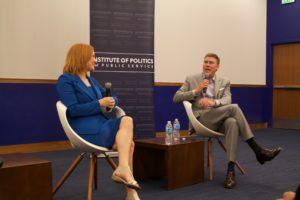
Former Obama Communications Director Jen Psaki and former Trump Communications Director Mike Dubke discuss their respective experiences in the White House.
Emma Kotfica is a staff writer for The Hoya.
President Donald Trump’s habit of communicating his unfiltered perspectives to the public through Twitter poses a unique challenge for the White House communications team, according to former White House Communications Director Mike Dubke.
At an event hosted by the Georgetown University Institute of Politics and Public Service on Tuesday, Dubke shared his experiences from his three-month tenure in the Trump White House alongside Jen Psaki, White House communications director under President Barack Obama. Psaki was a GU Politics fellow for the spring 2017 semester, and Dubke is a fellow for the fall 2017 semester.
Dubke said Trump’s tweets allowed him to communicate his unfettered perspectives to the public and are a powerful medium of communication for the president, but also derailed the administration’s message. Dubke blamed news organizations for spending too much time covering the president’s tweeted statements rather than his policy.
“What I’m concerned about is that our news organizations seem to be jumping from tweet to tweet, and short attention span to short attention span,” Dubke said. “A single tweet would then dictate what the programming was for the next hour and a half on cable news, which was an amazing power but also an amazing distraction.”
Because of Trump’s tweeting habit, Dubke said he struggled to control the administration’s daily messaging.
“The challenge, of course is that this narrative continues to change, and that’s what I was dealing with when I was there,” Dubke said. “Specifically because the president has this direct connect with the American people that, while President Obama had it, never really used it to the same degree [as Trump].”
Former WH Comms Directors & Fellows @jrpsaki (Spring ’17) and @mikedubke (Fall ’17) sticking around to answer student questions! pic.twitter.com/srzrvAZqpB
— Georgetown Politics (@GUPolitics) September 5, 2017
Psaki said not being in control of the narrative is part of the job, not solely a problem faced by the current administration.
“The unique thing about being in the White House is that you are responsible for commenting and speaking to everything, so it’s like the best-laid plans can often change,” Psaki said.
Nevertheless, Psaki described the communications director role as “one of the best jobs you can have in the White House.”
“It is way better than the press secretary job, because you get your hands in all of the strategy and you have a seat at the table with the policy teams determining decisions that are going to be made about policy, when things are going to be announced, how they should be rolled out and how they should be talked about,” Psaki said. “You are a decision-maker in ways that the press secretary is entirely capable of being but can’t be because their day is consumed by the press briefings.”
Dubke added that communications directors take the fall when plans go wrong.
“You’re also blamed for all the bad things that happen, even when it’s not your fault or you’re brought in after the decision has been made to explain the cleanup,” Dubke said.
Dubke served as Trump’s communications director for three months before tendering his resignation on May 18.
Dubke’s former boss has been noted for his attacks on press coverage. Trump routinely criticized the media in campaign rallies and called the press the “enemy of the American people” in a February tweet. According to Dubke, Trump’s frustration with media coverage derives from his understanding of the importance of their role.
“I know the president understands the role that the press plays in the democratic process,” Dubke said. “I think that’s where a good level of his frustration comes, where he is hearing things come out of the press that he doesn’t believe are true or are a slant on the truth that is trying to paint an entirely different picture.”




















